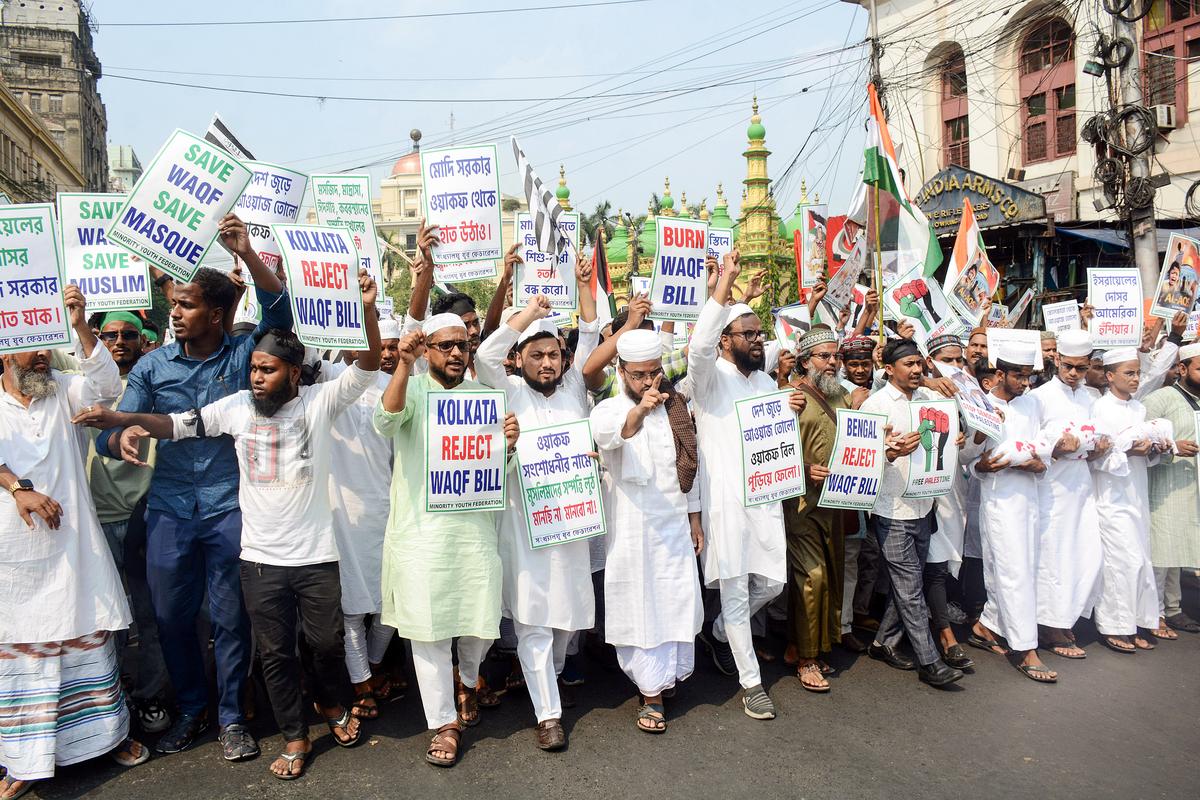Massive protests broke out across several Indian cities on Friday following the Parliament’s approval of the Waqf Amendment Bill, with demonstrators voicing fears of religious marginalisation and encroachment on minority rights. The unrest began shortly after Friday prayers and drew thousands into the streets in cities like Kolkata, Chennai, and Ahmedabad.
In West Bengal’s capital, a sea of protestors waving the Indian tricolour and carrying placards that read “Reject Waqf Bill” and “We oppose the Waqf amendment” assembled in public areas. The rallies, primarily led by the Joint Forum for Waqf Protection, caused traffic disruptions and stirred local political tensions ahead of next year’s state elections.
Ahmedabad Saw Intense Protest
Ahmedabad witnessed more intense scenes, with police attempting to disperse elderly protestors who were staging sit-ins on major roads. Law enforcement detained over 40 individuals, including the local AIMIM chief, as crowds resisted attempts to clear public spaces.
In Tamil Nadu, members of actor-turned-politician Vijay’s Tamilaga Vettri Kazhagam held demonstrations across key cities such as Chennai, Coimbatore, and Tiruchirappalli. Slogans condemning the bill echoed through the streets, as TVK leaders criticized the amendment for undermining the secular nature of Indian democracy.
Opposition Files Petition in SC
Meanwhile, the political and legal battle over the bill intensified. Congress MP Mohammed Jawed and AIMIM leader Asaduddin Owaisi filed petitions in the Supreme Court challenging the constitutionality of the legislation. According to Jawed, the bill introduces “unjust limitations” on Waqf property governance and threatens the autonomy of religious institutions. “You can’t just pass anything because you have the numbers,” he said, expressing hope the judiciary would step in.
The Waqf Amendment Bill, passed in the Rajya Sabha with 128 votes in favour and 95 against, had earlier cleared the Lok Sabha with a margin of 288-232. The bill proposes changes to the 1995 Act, including the mandatory inclusion of two non-Muslim members in state and central Waqf boards and a requirement for donors to certify themselves as practicing Muslims for at least five years.
Centre Defends Bill in Parliament
Despite the strong backlash, Union Minority Affairs Minister Kiren Rijiju defended the bill in Parliament, stating it is a forward-looking reform meant to enhance transparency and efficiency in Waqf property management. He also clarified that the law will not apply retroactively, a concern raised by many opponents. Rijiju later said the law would soon be renamed the UMEED Bill—Unified Waqf Management Empowerment Efficiency and Development.
Congress Criticises Bill
Congress leaders, including Sonia Gandhi and Mallikarjun Kharge, condemned the bill as a direct attack on the Constitution’s secular principles. Gandhi described it as “bulldozed” legislation, while Kharge criticised the ruling government’s “negative approach” during the budget session.
The passage of the bill has added fuel to a politically charged atmosphere, with Mamata Banerjee vowing to protect minority land rights in Bengal and warning that the legislation would be overturned if a new government comes to power at the Centre.
The bill’s approval followed extensive debates in both houses—over 12 hours in the Lok Sabha and more than 17 hours in the Rajya Sabha—marking one of the most contentious legislative sessions in recent memory.


